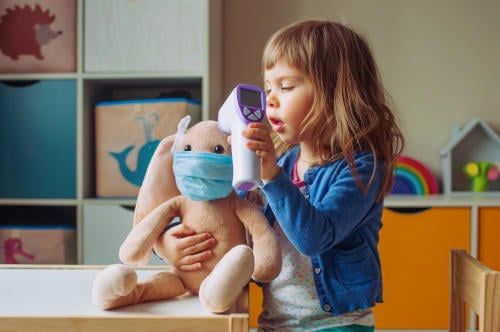Coined as a condition in the 1980s, Pathological Demand Avoidance, or PDA as it is more commonly known, has only become more widely recognised since the turn of the century. Whilst we are still on a learning curve, there is growing support and expertise now available at our fingertips about what it means to live with this behavioural pattern. But what is PDA, and more specifically, what is it like to have this condition, or live with someone that has it?
Who has PDA?

Presently, the term PDA is typically attributed to a minority of children who are on the autistic spectrum. It is not known exactly how many people have it, but the general consensus between professionals suggests that approximately 20% of autistic children have traits of this condition.
It is currently unknown if PDA can present itself in children that do not have an ASD (Autistic Spectrum Disorder) diagnosis.
PDA presents itself in various forms. Common symptoms include:
- A rejection of instructions and/or questions.
- A need for autonomy over their world.
- An avoidance of school culture, learning tasks and praise.
- Anxiety and/or dysregulation when overwhelmed by a, b and c above.
- Impulsivity
- Obsessive behaviour
- Sensory seeking or avoidant tendencies
How Can I Support My Child With PDA?

If a child is diagnosed with PDA, it could take some time to make sense of what this means for you and your family: How can you help your child? How can you offer reassurance? How can you find a comfort zone where things are manageable?
As children, mums, dads, grandparents and carers become aware of a diagnosis, their mindset will need a period of adjustment as they learn about what it means for them and their family to live with PDA. There will be questions and conundrums that arise, as they receive and grasp the information about this aspect of SEND culture.
If you are a parent or carer adjusting to the idea of PDA, it may feel a bit daunting. However, as you test the water and discover, a new mindset will crystalise as matters make more sense and everything just starts to feel a little bit more comfortable.
SEND specialist, Kate, who has a MSc in psychology, states, “Each child with PDA has a different profile. As you spend time with your child, it will become more apparent how their mind works, and how their PDA traits impact on them. From there you can work towards the best approach that will suit their needs.”
As time passes, visual aids, communication techniques and the use of altered language will factor increasingly into your daily existence. As these techniques become well-received by your child, you will start to feel the cogs turning in the right direction.
Creating Art Activities, Fun & Silly Play

As mum to a ten-year-old son with PDA, Poppy has a huge bank of suggestions that could help a child with PDA symptoms. When considering activities, she promotes creative activities, in addition to fun/silly playtime. Poppy explains, “The best way to bond with him is through play, especially when humour is injected into it.”
Her suggestions have helped her son to stay more regulated, whilst also allowing him the autonomy he needs as a child with the specific behavioural pattern that his PDA dictates.
Poppy emphasises that, “He has a very extroverted expression of PDA and is also predominantly sensory seeking. There are also PDA children who have more introverted expressions, and children who are more sensory avoidant.”
To name a few of the more sensory seeking activities, Poppy suggests:
- Making sock puppets
- Creating a potion – using anything available from your kitchen that is edible!
- Making your own slime
- Guess the scent, then write it down or say what it is
- Make a magnetic treasure hunt with sand or rice
To find the right sensory level to suit your child’s PDA will take a bit of trial and error. If your child is more sensory avoidant, it is advisable to keep a bucket of water handy during play, to wash hands in case of any discomforting sensory experiences.
Using drier materials such as dry sand or offering a child tongs to use instead of their hands, will free them from the potential sensitivity to touching certain textures.
Discovering Through Role Play

PDA children may explore by immersing themselves into role play, adopting different characters or getting lost in an imaginative world. This process can be strengthening, as a child will conduct their own experiment in a fictional space, and contemplate their reactions to other characters. They will also see how their own responses can be influential and change the course of events.
Role play can help children make their own sense of their world in a non-threatening environment where they can find a happier place, and simply just be.
Strewing is a technique that requires a parent or teacher to make various activities available, without saying what task should be tried, leaving the choice with a child.
Poppy explains, “Strewing allows your child to discover something, with no demand to use it.” She continues, “My son then has the autonomy to choose to draw or write of his own accord. This can work with many activities.”
Strewing minimises the need for demands; a child feels less pressure as they are left with the autonomy to choose, or not.
Spotting Rising Anxiety & Dysregulation

How can you know if your child is feeling agitated?
Poppy suggests a parent will learn to read the signs that anxiety is increasing, “He may display signs of fidgeting, or becoming more active.” She declares that the suggestion of a movement break at these times would be a positive step, “Either he can request this, or you could suggest it based on his cues, such as becoming more restless or upset. You could say, ‘I wonder if you need a movement break?’ “
Paraphrasing in this way allows for the delivery of the sentence as an afterthought, and not as a question or a demand.
Four steps forward, three steps back, is still one step forward! Every step is golden, and with each one, small milestones will be reached. Keeping a journal of the progress you are making with your child can be invaluable in helping you mark the improvements you have achieved together.
As you put your best foot forward, it is important to be kind to yourself, and not expect an overnight solution. Pace yourself as you and your child navigate your way through each stage of the journey. Note the questions that come to mind and ensure that you get them answered. For example: How can I discipline my child, now I know she has PDA?
Poppy acknowledges that parents may not always know how to get the advice they need, especially at the start of their PDA journey. She reflects, “What I have found helpful in understanding the mechanism behind PDA and getting helpful strategies, has been to follow ‘At Peace Parents’ on Instagram and Facebook. It has completely changed my understanding of PDA and how I support my son.”
She adds, “If you also check out the PDA Society website, they have lots of useful advice, resources and information, including their PANDA approaches.”
The PDA Society uses the word PANDA as a mnemonic to guide parents through the most effective approaches when considering how to help a child establish a daily routine that is manageable. The PANDA approach stands for:
- P – Pick Battles
- A – Anxiety Management
- N – Negotiation and Collaboration
- D – Disguise and Manage Demands
- A – Adaption
There are many PDA routes and services online available to parents and carers, as well as support groups, that can provide a safe zone where you can be with like-minded people.
A list of current support groups can be found at the PDA Society
Building A Bank Of Knowledge
There may be unanswerable questions, but recording queries, continuing to question, and trying new techniques can make it feel much more like you are finding your way along a path, rather than climbing a hill.
Your gut instinct is there for a reason; trust it and let it guide you. As you and your child try new strategies and become more acquainted with PDA culture, an awareness will grow, associated language will become more familiar, and life will feel regular, relatable and more comfortable.




